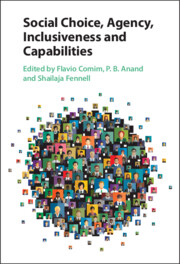Book contents
- Social Choice, Agency, Inclusiveness and Capabilities
- Social Choice, Agency, Inclusiveness and Capabilities
- Copyright page
- Contents
- Figures
- Tables
- Contributors
- Preface and Acknowledgements
- 1 Introduction: social choice, agency, inclusiveness and capabilities
- Part I Social Choice and Capabilities
- Part II Inclusiveness, Social and Individual Agency
- 7 In defence of inclusiveness
- 8 Exploring Sen on self-interest and commitment
- 9 Incorporating an emotional dimension in the capability approach
- 10 Sufficiency re-examined
- 11 Adaptive preferences versus internalization in deprivation
- 12 Enriching agency in the capability approach through social theory contributions
- 13 Creativity and capabilities
- Part III Social Choice and Capabilities in Action
- Index
- References
13 - Creativity and capabilities
A problem of change and uncertainty?
from Part II - Inclusiveness, Social and Individual Agency
Published online by Cambridge University Press: 28 March 2024
- Social Choice, Agency, Inclusiveness and Capabilities
- Social Choice, Agency, Inclusiveness and Capabilities
- Copyright page
- Contents
- Figures
- Tables
- Contributors
- Preface and Acknowledgements
- 1 Introduction: social choice, agency, inclusiveness and capabilities
- Part I Social Choice and Capabilities
- Part II Inclusiveness, Social and Individual Agency
- 7 In defence of inclusiveness
- 8 Exploring Sen on self-interest and commitment
- 9 Incorporating an emotional dimension in the capability approach
- 10 Sufficiency re-examined
- 11 Adaptive preferences versus internalization in deprivation
- 12 Enriching agency in the capability approach through social theory contributions
- 13 Creativity and capabilities
- Part III Social Choice and Capabilities in Action
- Index
- References
Summary
Advances in technology have opened up new opportunities for people to live in different ways. Human creativity is one of the most important causes of changes of this kind. Flourishing probably requires space for people to be creative (in a broad sense) and to benefit from (and rejoice in) the creativity of others. But creativity is often destructive, as Joseph Schumpeter famously noted, destroying value as well as creating it. That change will take place is predictable, but the direction of the change and how rapid it will be are things that probably cannot be known ex ante. Predictions made 50 years ago about what life would be like today are not noted for their accuracy. More recently, the uses of social media have gone beyond what the developers of the technology could foresee. In a world of increasing and unpredictable technological change, what will a life that we have reason to value look like?
- Type
- Chapter
- Information
- Social Choice, Agency, Inclusiveness and Capabilities , pp. 284 - 302Publisher: Cambridge University PressPrint publication year: 2024

